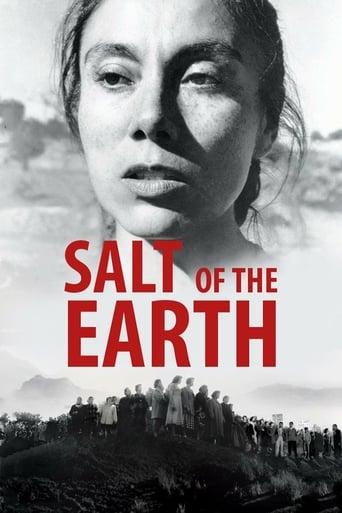

If a bit awkward and rough edged in form, a bit on the nose in it's politics, and a bit melodramatic in it's telling, this is an historically important early 'independent' film. Made by artists largely blacklisted from Hollywood for liberal beliefs, and/or for refusing to testify against others, this was the only film in America's history that was itself blacklisted, and kept out of theaters despite positive reviews. Yet what it preached; basic dignity and rights for Hispanics, for women, and for workers could hardly be seen, even then, as a real threat to America -- had it not been for hysteria towards all things liberal, progressive, or intellectual –- those things being lumped in with communist revolutionary activity. It's remarkable for a 1954 film to see an American film with all the leading roles being Hispanic, and played by Hispanics, not white actors in 'brown face'. Even more impressive is the film's early but potent feminist viewpoint. The issue of women also adds a nice level of complexity to a story that could have felt too simplistic in terms of right and wrong. The male Hispanic workers are almost as guilty of oppressing their wives as the Anglo bosses are of oppressing their Hispanic workers. So there's an acknowledgment that everyone still had a lot to learn about creating an equal society in those days. Along with the occasionally awkward acting (most of the cast were non-professionals) and occasionally too blatant speech-making, there are some very moving, human and inspiring moments. And in a nice twist of fate, after being blacklisted from theaters and kept from the public, the film now resides on the national registry of important films.
... View MoreThe propagation of fear of the "other", or the unknown, is a fervent device used by governments for the control of the masses (the population). In the 1940's and 1950's in the west (particularly the United States - and to a lesser extent the UK), the common object of fear was the spread of Communism. In 1947, this paranoia about the infiltration of socialist ideologies into US politics, culminated in the organisation of HUAC (House Un-American Activities Committee), which began a witch hunt for any persons involving themselves (allegedly) in Communist politics and ideas. Propaganda was in full swing by 1954, and the hunt was extended into the arts, particularly Hollywood - with its "Harbouring" of socialism - which led to the imprisonment of "The Hollywood Ten" which included the writers and filmmakers involved in the making of Salt of the Earth - which was inevitably blacklisted.With a largely non-professional cast (only five were professionals), this neo-realist style film tells the story - based on real events - of a workers strike for equality of pay and conditions for American- Mexicans working in the Delaware Zinc mines in New Mexico. Told from the perspective of Esperanza Quintero (Rosaura Revueltas - one of the five actual actors), the film opens with a domestic scene and her narration, as she outlines their social conditions, and the small community. Her husband, Ramon (incredibly heartfelt performance by non-professional, Juan Chacon), signifies the "traditional" male, whose displays a reluctance for his wife to involve herself with nothing but the upkeep of the home, and the raising of their children (not a particularly revelatory experience in the 1950's).After the failure of the men - bound by union restrictions - to successfully picket the mine, the women of the village take their places, creating a barrier to the entrance. This destabilises the workers union to begin with, and fundamentally disrupts the home life of Ramon and Esperanza - whose conventional roles are reversed, creating an emasculated man-of-the-house. The reactions of the mining management/owners leads to the arrest of all the women, which creates an even greater sense of solidarity between the women, and eventually (once they realise the importance of this strike) the men.Within the context of this film, it is hard to believe in this day that this film (which perpetuates socialist ideas - Communist theories) was regarded as dangerous to the point of being blacklisted. However, what this part of history highlights is that these political ideas are simply dangerous to a hegemony of market power. That is, the fear of Communism (or socialism) is simply that it would - in theory - give equal rights and fair wages to the workers of any company or corporation. Of course, if socialism did spread, this would mean the obliteration of the free market economy that has so far simply created a greater divide of rich and poor in the West, and ultimately led to such incredible greed, and intrinsically creating the banking crisis of 2008.With a strong cast of actors and locals, this film is both enlightening and emotionally mature. It is itself a piece of pure propaganda, but it skillfully emphasises the socialist ideal of equality. The film also raises some interesting feminist questions - a movement that didn't really become part of popular culture until the late '60's and '70's - and gravitates towards alternative social roles for women. It was of course ignored by the Hollywood system, but eventually found audiences within film schools and workers unions. A common reaction was astounding: The Hollywood Reporter (a trade magazine) made a bold and frivolous statement claiming that the film was made under the direct orders of the Kremlin. It is an incredibly important piece of social history, that is also successful as an interesting and entertaining slice of cinema.www.the-wrath-of-blog.blogspot.com
... View MoreThe Salt of the Earth, which came out in 1954 paints an almost too real picture of how migrant workers were treated before the civil rights movement. It is easy to see why the United States government, which was going through "The Red Scare" during this time, blacklisted this film. The film touches on and provokes many issues that were very sensitive during this era. Issues such as racism, equality, and feminism are the key themes in the movie. Racism was still very apparent in the United States during the 1950's, namely because the civil rights movement had not happened yet. The film pits the whites or "Anglos" against the Mexican workers. However, not all the whites in the film are depicted as evil. There are a few Caucasian workers who side themselves with the Mexicans. This gives the film a much more "real" atmosphere to it because it doesn't allude to one race being good and the other evil. Instead of simply having the whites be the antagonist, the film sets the leader of the mining company up to be the antagonist. Despite having a few whites on the side of the Mexican workers the film clearly sympathizes with the Mexicans. The film controls the in a way so the audience will undoubtedly root with the workers. The Mexican workers have poor safety requirements, which constantly lead to accidents on the site. This is all so the company can save money. When the Mexicans complain of this they are threatened with being replaced with an American worker by the foreman. The film does a good job of painting the leaders of the mining company as evil. There is a scene in the beginning where the foreman tells the workers to get back to work right after one of the workers is nearly killed in an explosion. This shows that the leaders have no compassion for the workers and that they are only in the business for the money with no care of the well being of the Mexicans. Also, the scene where they capture Ramon Quintero and beat him is very powerful and really makes you sympathize with that character. Another issue the film tries to push is feminism. The film starts off early with the Mexican workers acting very sexist toward their wives. Ramon is very controlling of his wife, Esperanza. There is an early scene where Ramon tells Esperanza to stop crying and wasting her time listening to the radio. This scene alone sets up the fact that sexism is an issue in this town. Another scene that depicts this fact is when all the women are trying to convince Esperanza to take part in a picket line. One of the wives complains that she works very hard and is still treated as though she is useless by her husband. However, once the men are not allowed to take part in the picket line the women become very involved. The men begin to understand that the wives can help with the strike. The film came out in 1954. The United States was in a false sense of calm during this time. The economy was booming. This lead to the growth of materialism and the country was becoming vastly capitalist. With the exception of the cold war and the communist scare the country was going through a very calm time. Salt of the Earth acts as a sort of a wake up call. It pushes all of these unseen issues to the light so people can become aware that there are still injustices going on inside the country. The main point of the film is equality. The film's conflict is a struggle for the races and sexes to become equal in the eyes of the government. Salt of the Earth was clearly ahead of it's time.
... View MoreThat this movie was banned in America says much about America in the fifties. That this movie is still novel and misunderstood speaks volumes concerning America today. For example, most who watch this movie will never ask themselves why is law enforcement monitoring the strikers. Law enforcement almost always takes a position in favor of management over the workers. I'm not talking about the unlawful action of the two cops in the back of the car but of the original stance of the police from the beginning at the picket line. That it just seems natural that they acted the way they did is a fault in you and me. Further, many will look at the movie in disgust as it shows the big mean corporation as the villain. But the movie accurately portrays the actions of management in this incident. Like it or not this is how management is and ever more will be. Management today is more sophisticated with its use of public relations but essentially the same now as then.Finally to readers of a more conservative view, I ask. If the strikers are guilty of disrespect of the property rights of the owners by picketing, would you not feel that the company was criminally culpable of injuring the miner who was carried out of the mine?I have not seen a more realistic portrayal of the subject matter in any film made at any time. Still many people cannot see this movie as their prejudice blinds them to the subject. That only makes the movie greater in my opinion.Finally, the actress who so skillfully portrayed Esperanza was deported back to Mexico and never played another role in a film in the US. At a time when Nixon was over in the USSR showing how much better the American way was than the communist way we were acting no more open to ideas than than they were behind the iron curtain. How much more proof is required to show that this movie was needed in America at the time of its banning. We need it just as much now.
... View More